
Written by Milena Sagawa-Krasny
On 5 November 2019, the European Court of Justice (ECJ) ruled that Poland’s decision to lower their judges’ retirement age broke EU law. This is only the latest example of what has developed into a long-standing feud between Brussels and Warsaw. The conflict between the EU and Poland is much more than an anecdote of relevance merely to those who hold a niche interest in Eastern Europe or EU law. It is a tale of the battle over values, the existence and the future of Europe. The rule of law lies at the heart of the functioning of the European project and is a quintessential value upon which the Union was founded, which, in many ways, protects all other values. Ultimately, the European project is one of cooperation, and this cooperation rests upon the mutual trust between Member States in each other’s legal systems. What is at stake here is thus the very essence of the EU itself, which is why the European Commission must fight back.
To start with, let us see what the latest ECJ ruling was all about. Poland carried out a judicial reform in 2017, lowering the retirement age of its judges and introducing different retirement ages depending on the sex of the judge. The Polish government, run by the Law and Justice Party (PiS), argued that it was attempting to tackle corruption by replacing judges whose career dated back to the Communist era. Critics, however, alleged that the government was just seeking to appoint loyalists instead (BBC News, 2019). In 2018, Poland introduced a law to force the retirement of 40% of the supreme court judges. However, earlier this year, the ECJ found that this 2018 law was in breach of EU law. Following a backlash at home as well as from Brussels, the government has already reversed the 2017 reforms. Finally, on 5 November 2019, the ECJ delivered another blow to the PiS, as it ruled that the 2017 reforms also broke EU law.
This case is part of a broader pattern of illiberalism that has gained significant influence almost everywhere inside the EU, openly challenging the EU from within. The Visegrad Group, an alliance composed of the Czech Republic, Hungary, Poland, and Slovakia, has increasingly come to worry Western Europe. Their leaders have largely shifted to ‘illiberal democracies’, turning away from political liberalism and the rule of law (Morillas, 2017). In Hungary and Poland, the governments have acted systematically over a sustained time period to eliminate checks and balances on the power of the ruling party’s leadership (Lane Scheppele and Pech, 2018). Critics allege that courts have been crippled, the press has been suppressed, refugees have been refused solidarity, NGOs have been discredited and branded as foreign agents, and universities have been silenced (Reding, 2017). At the same time, these countries still receive extensive financial benefits from EU membership, especially from structural and cohesion funds (Morillas, 2017).
Accordingly, one can argue that such illiberalism, as observable within the cases of Poland and Hungary, poses a danger to the EU. First of all, philosophically speaking, liberal values constitute the founding values of the EU. Europe can look back on a long history of these ideas; the heritage of the argument about the rule of law can be traced back to a number of thinkers, from Aristotle (c. 350 BC) to John Locke (1689) and Montesquieu (1748) during the European Enlightenment (Waldron, 2016). For instance, Article 2 of the Treaty on the European Union states that the Union is founded on the values of “respect for human dignity, freedom, democracy, equality, the rule of law and respect for human rights, including the rights of persons belonging to minorities” (De Schutter, 2017). The preamble to the basic EU treaty, the Lisbon treaty, states that the signatory countries are ‘drawing inspiration from the cultural, religious and humanist inheritance of Europe, from which have developed the universal values of the inviolable and inalienable rights of the human person, freedom, democracy, equality and the rule of law.’ As Frans Timmermans said (2015): “The rule of law is part of Europe’s DNA, it’s part of where we come from and where we need to go.”
However, liberal values are more than just the philosophical underpinnings of the EU; they are also vital to the practical functioning and, therefore, to the very existence of the EU in its current form. The functioning of the Union as a legal and political system depends upon the assumption that all Member States are broadly in compliance with the principles listed in Article 2 TEU (Magen, 2016) in the sense that all national courts are also European courts. This is possible because the European legal system rests on the principle of ‘mutual recognition’ – the notion that a court in one Member State can have faith in the decisions made by a court in another (Davies, 2019).
This trust in the rule of law forms the basis of the internal single market and the Area of Freedom, Security and Justice (Magen, 2016). The latter reaches as far as the European Arrest Warrant, which replaced extradition safeguards for a suspected or convicted criminal in favour of a Union-wide arrest and transfer system. If the rule of law is at risk, so are police, prosecutorial and judicial operation.
The actions of an EU Member State’s government have consequences beyond the borders of the Member State in question. This is because not only all EU citizens residing in that particular country are automatically affected, but also, EU citizens who are impacted by this country’s participation in the EU’s decision-making processes in European Institutions are heavily influenced as well (Kochenov and Pech, 2015).
Finally, the rule of law is an eligibility criterion for EU membership and constitutes an integral part of EU foreign policy. Article 21(1) on the Treaty on the Functioning of the European Union states that the EU ‘… seeks to advance in the wider world: democracy, the rule of law…’. Consequently, the credibility of EU foreign policy is at stake, especially its efforts to stimulate reform in the Balkans (Selih et al, 2017).
Moreover, if the legal system at the core of the EU collapses, it is only a matter of time until the EU as a whole will follow. So, what can the EU do? In stark contrasts to the sinister image that Eurosceptics have painted of the EU as a larger-than-life overpowering entity, previous attempts made by the EU to fight illiberalism have clearly shown the limits of its power. In 2017, for example, the European Commission triggered Article 7 of the EU Treaty, marking the first time it had formally threatened to revoke a Member State’s voting rights. Article 7 is a mechanism of the Lisbon Treaty that ensures “all EU countries respect the common values of the EU” (Martin, 2018). It was supposed to mitigate and prevent Member States from backsliding on European values and the rule of law (Martin, 2018). Unfortunately, Article 7 has shown itself to be ineffective when it comes to triggering sanctions because it requires unanimous agreement (minus the state concerned) on the adoption of sanctions (Selih et al, 2017).
Similarly, a ’light-touch’, diplomatic approach has also failed. In 2014, the Commission established the Rule of Law framework, which aims to find a solution through an open dialogue with the Member State in question. It includes three steps. First, the Commission assesses the situation in a Member State. This is followed by the issuance of a legally non-binding recommendation. Finally, the Commission continues monitoring how the Member State is following up on its recommendation. However, a process like this requires cooperation on both sides and is doomed to fail when a state simply refuses to follow the recommendation issued by the Commission (Jaworek, 2018). The Polish government has made clear from the very beginning that it is not interested in taking the Commission’s actions seriously, paying only lip service to the Rule of Law framework procedure (Niklewiwicz, 2017). In countries where the government has consciously decided to challenge EU values, this approach has been proven unable to generate meaningful change and end systemic violations of EU values (Pech and Kochenov, 2015).
Another approach could be a ‘carrot-and-stick policy’ as Poland and Hungary profit massively from EU funds. In 2017, Poland was the biggest beneficiary of EU funds, while Hungary was the fourth biggest beneficiary (Bershidsky, 2019). Since the EU’s main leverage on its Member States is financial, it could opt for a strategy where EU funds are allocated only in exchange for compliance with the rule of law. However, this move could be seen as punishment for the people rather than their government, which could contribute to Euroscepticism, and inflict disproportionate harm upon poorer regions and vulnerable groups (Selih et al, 2017). Furthermore, as the Czech top diplomat Andrej Babis has remarked, threatening to punish the EU Member States financially for straying away from European values would further strengthen populism (Ponikelska and Laca, 2019).
Another policy that the Commission has yet to try would be the launching of systemic infringement procedures. Currently, infringement procedures can only be started when a Member State is accused of violating a specific EU law, as opposed to broader, chronic non-compliance with EU laws and values. A Member State can correct a specific infringement without tackling the underlying problems. A case in point was when Hungary changed the mandatory retirement age for judges from 70 to 62 in 2012, forcing hundreds of judges to retire and be replaced with supporters of the ruling party. The European Commission argued that this violated EU rules on age discrimination, and Hungary lost the case. Still, Hungary was able to comply with the ECJ ruling simply by compensating the prematurely retired judges, without wholly removing the threat to judicial independence. Nevertheless, the Commission could bundle together a set of infringing practices into a systemic infringement action. Thereby, the Commission could demonstrate that a Member State has systematically breached EU law in multiple connected ways (Lane Scheppele, 2014). Accordingly, systemic infringement would demand systemic compliance, in which case secondary legislation could be enacted to withhold EU funds as an incentive for compliance or to cut funds for chronic non-compliance. Cutting funds for systemic non-compliance would not require treaty change, which would allow the Commission to take more effective and faster action (Lane Scheppele, 2014; Reding 2017). Consequently, this would tackle the underlying political intent and behaviour responsible for the infringement, rather than addressing only one of its manifestations (Schmidt and Bodganowicz, 2018).
Of course, it is possible to conceive of certain political risks as a consequence of this policy backfiring, however, in light of the previous inability of the European Union to hold Member States accountable for their actions, I would like to offer the following points to consider. Firstly, the diplomatic Rule of Law framework approach has failed to meet its goals. As Poland has shown, a government that is unwilling to cooperate with the Commission has no hard incentive to do so and can ignore the concerns of the Commission without suffering from any consequences. This would not be possible under the use of systemic infringement procedures, as non-compliance could result in the withholding, or cutting off EU funds without treaty change. Secondly, the triggering of Article 7 has shown itself to be an ineffective punitive mechanism, as it requires unanimous agreement of all Member States on the adoption of sanctions. Under systemic infringement procedures, it would not be possible for a single Member State to block punitive action for chronic non-compliance. Lastly, it is crucial that the rule of law is not seen as an East versus West opposition, so the process needs to be depoliticised (Michelot, 2018). This depoliticization can be accomplished through legal instruments (Roberts, 2010). If the ultimate decision-maker is the Court, the legitimacy of the procedure is maximised and depoliticised (Schmidt and Bodganowicz, 2018).
If the EU fails to defend the rule of law, it risks being eroded from within. The rule of law, in many ways, protects all the other liberal values upon which the Union was founded. If the trust among Member States in each other’s courts is lost, it is only a matter of time before the same fate befalls cooperation in the internal single market, and the Area of Freedom, Security, and Justice. What is at stake here is the very existence of the EU as we know it.
The European Parliament elections in 2019 saw the highest turnout across the EU in twenty years. Pro-EU liberals and greens, but also Eurosceptics all made gains. These elections have shown that people across the Union care; Eurosceptics are threatening the EU from within, but there are European citizens across the Union who still believe in the European project. For these people, and for its own future, the EU needs to rise to the challenge of fighting illiberalism.
References
BBC News. (2019). Poland broke EU law by cut to judge retirement age. [online] Available at: https://www.bbc.co.uk/news/world-europe-50302102 [Accessed 13 Nov. 2019].
Bershidsky, L. (2019). How the EU Plans to Punish Hungary and Poland. [online] Bloomberg.com. Available at: https://www.bloomberg.com/opinion/articles/2019-01-18/how-the-eu-plans-to-punish-hungary-and-poland [Accessed 31 Mar. 2019].
Davies, C. (2019). The battle for the rule of law in Poland will have consequences across Europe. Prospect Magazine. [online] Available at: https://www.prospectmagazine.co.uk/world/the-battle-for-the-rule-of-law-in-poland-will-have-consequences-across-europe [Accessed 13 Nov. 2019].
De Schutter, O. (2017). INFRINGEMENT PROCEEDINGS AS A TOOL FOR THE ENFORCEMENT OF FUNDAMENTAL RIGHTS IN THE EUROPEAN UNION. [ebook] Brussels: Open Society European Policy Institute. Available at: https://www.opensocietyfoundations.org/sites/default/files/infringement-proceedings-as-tool-for-enforcement-of-fundamental-rights-in-eu-20171214.pdf [Accessed 31 Mar. 2019].
Jaworek, P. (2018). Upholding the rule of law in times of crisis: (ineffective) procedures under Article 7 TEU and possible solutions – KSLR EU Law Blog. [online] Blogs.kcl.ac.uk. Available at: https://blogs.kcl.ac.uk/kslreuropeanlawblog/?p=1230#.XImBRbj482w [Accessed 31 Mar. 2019].
Kochenov, D. and Pech, L. (2015). Upholding the Rule of Law in the EU: On the Commission’s Pre-Article 7 Procedure as a Timid Step in the Right Direction. [online] Social Science Research Network. Available at: https://papers.ssrn.com/sol3/papers.cfm?abstract_id=2625602 [Accessed 21 Mar. 2019].
Lane Scheppele, K. (2014). Making Infringement Procedures More Effective: A Comment on Commission v. Hungary, Case C-288/12 (8 April 2014) (Grand Chamber). [online] eutopialaw. Available at: https://eutopialaw.com/2014/04/29/making-infringement-procedures-more-effective-a-comment-on-commission-v-hungary-case-c-28812-8-april-2014-grand-chamber/ [Accessed 31 Mar. 2019].
Lane Scheppele, K. and Pech, L. (2018). Didn’t the EU Learn That These Rule-of-Law Interventions Don’t Work?. [Blog] Verfassungsblog. Available at: https://verfassungsblog.de/didnt-the-eu-learn-that-these-rule-of-law-interventions-dont-work/ [Accessed 21 Mar. 2019].
Magen, A. (2016). Cracks in the Foundations: Understanding the Great Rule of Law Debate in the EU. JCMS: Journal of Common Market Studies, 54(5), pp.1050-1061.
Martin, D. (2018). What is Article 7 of the EU Treaty? | DW | 12.09.2018. [online] DW.COM. Available at: https://www.dw.com/en/what-is-article-7-of-the-eu-treaty/a-41876855 [Accessed 13 Nov. 2019].
Michelot, M. (2018). How Can Europe Repair Breaches of the Rule of Law?. [ebook] Paris, Berlin: Institut Delors. Available at: http://institutdelors.eu/publications/pays-de-visegrad-quelle-reponse-europeenne-aux-defaillances-de-letat-de-droit/?lang=en [Accessed 21 Mar. 2019].
Morillas, P. (2017). Illiberal democracies in the EU: The Visegrad Group and the risk of disintegration. [pdf] Barcelona: Barcelona Centre for International Affairs. Available at: https://www.cidob.org/en/publications/publication_series/monographs/monographs/illiberal_democracies_in_the_eu_the_visegrad_group_and_the_risk_of_disintegration [Accessed 21 Mar. 2019].
Müller, J.W., (2015). Should the EU Protect Democracy and the Rule of Law inside Member States? European Law Journal, 21(2), pp.141–160.
Niklewicz, K. (2017). Safeguarding the Rule of Law within the EU: Lessons from the Polish Experience. European View, 16(2), pp.281-291.
Ponikelska, L. and Laca, P. (2019). EU’s Budget Stick Fuels Rather Than Stops Populism, Czechs Warn. [online] Bloomberg.com. Available at: https://www.bloomberg.com/news/articles/2019-01-11/eu-s-budget-stick-fuels-rather-than-stops-populism-czechs-warn [Accessed 31 Mar. 2019].
Roberts, A. (2010). The logic of discipline. Oxford: Oxford University Press.
Reding, V. (2017). Interview – Rule of Law in Poland and Hungary: “Our fundamental values are under attack”. [online] Bertelsmann-stiftung.de. Available at: https://www.bertelsmann-stiftung.de/en/topics/latest-news/2017/september/poland-and-hungary-our-fundamental-values-are-under-attack [Accessed 31 Mar. 2019].
Schmidt, M. and Bodganowicz, P. (2018). The Infringement Procedure in the Rule of Law Crisis: How to make effective use of Article 258 TFEU. Common Market Law Review, [online] 55(4), pp.1061-1100. Available at: https://www.kluwerlawonline.com/abstract.php?area=Journals&id=COLA2018093.
Selih, J., Bond, I. and Dolan, C. (2017). Can EU funds promote the rule of law in Europe?. [ebook] Centre for European Reform. Available at: https://cer.eu/sites/default/files/pbrief_structural_funds_nov17.pdf [Accessed 21 Mar. 2019].
Timmermans, F., European Commission (2015). The European Union and the Rule of Law – Keynote speech at Conference on the Rule of Law, Tilburg University. [online] Available at: https://ec.europa.eu/commission/commissioners/2014-2019/timmermans/announcements/european-union-and-rule-law-keynote-speech-conference-rule-law-tilburg-university-31-august-2015_en [Accessed 13 Nov. 2019].
Waldron, J. (2016). The Rule of Law. [online] Plato.stanford.edu. Available at: https://plato.stanford.edu/cgi-bin/encyclopedia/archinfo.cgi?entry=rule-of-law). [Accessed 13 Nov. 2019].

 Domestic abuse in England & Wales: a historical legal gap bridged by Section 76 of the Serious Crime Act 2015?
Domestic abuse in England & Wales: a historical legal gap bridged by Section 76 of the Serious Crime Act 2015?  Looking back at Burden and Burden v. the UK: Are siblings being legally overlooked?
Looking back at Burden and Burden v. the UK: Are siblings being legally overlooked?  The European Housing Crisis from the Human Rights Perspective
The European Housing Crisis from the Human Rights Perspective  Female Suicide Bombers As A Security Threat: Towards A More Comprehensive And Inclusive Approach
Female Suicide Bombers As A Security Threat: Towards A More Comprehensive And Inclusive Approach 


